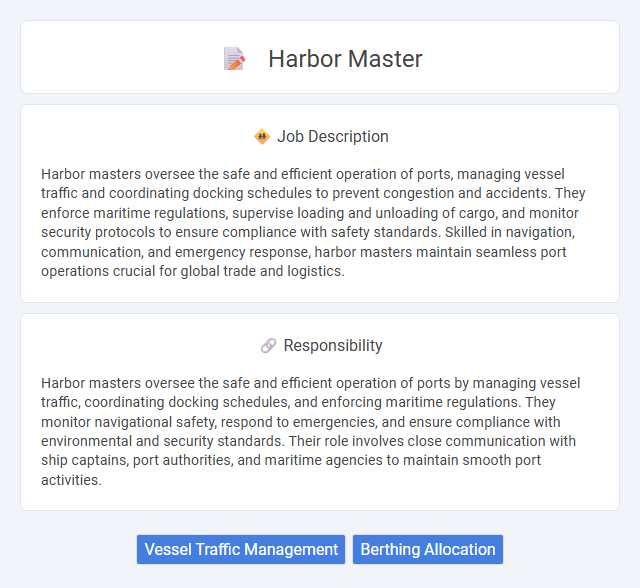
Harbor masters oversee the safe and efficient operation of ports, managing vessel traffic and coordinating docking schedules to prevent congestion and accidents. They enforce maritime regulations, supervise loading and unloading of cargo, and monitor security protocols to ensure compliance with safety standards. Skilled in navigation, communication, and emergency response, harbor masters maintain seamless port operations crucial for global trade and logistics.
Harbor master positions likely suit individuals who possess strong leadership skills and can maintain composure under pressure, given the demanding nature of managing port operations and ensuring maritime safety. Candidates with a keen attention to detail and excellent communication abilities may have a higher probability of success in coordinating vessel traffic and enforcing regulations. Physical stamina and adaptability to varying weather conditions could also influence suitability, as the role often requires extended hours outdoors.
Qualification
Harbor masters typically require a combination of maritime experience and formal certifications such as a captain's license issued by a national maritime authority. Strong knowledge of navigation, port operations, and safety regulations is essential, alongside skills in vessel traffic management and emergency response. Advanced qualifications in maritime law, customs procedures, and environmental protection enhance a harbor master's ability to oversee port activities effectively.
Responsibility
Harbor masters oversee the safe and efficient operation of ports by managing vessel traffic, coordinating docking schedules, and enforcing maritime regulations. They monitor navigational safety, respond to emergencies, and ensure compliance with environmental and security standards. Their role involves close communication with ship captains, port authorities, and maritime agencies to maintain smooth port activities.
Benefit
Working as a harbor master could offer the benefit of a competitive salary paired with comprehensive health and retirement plans, which may provide financial security. There is likely an opportunity to develop leadership and crisis management skills through daily coordination of port activities and emergency response. The role might also afford a unique chance to engage with maritime industry stakeholders and contribute to the safe and efficient operation of harbor facilities.
Challenge
Harbor master positions likely involve managing complex logistics and ensuring vessel safety within busy port environments, presenting continuous operational challenges. The role probably demands quick decision-making skills to address unpredictable weather conditions and emergency situations. Navigating regulatory compliance and coordinating among diverse maritime stakeholders are also expected to test problem-solving abilities regularly.
Career Advancement
A Harbor Master oversees port operations, coordinating vessel movements and ensuring maritime safety, which builds critical leadership and logistics management skills. Progression opportunities include advancing to senior port management roles, maritime operations director, or regulatory compliance advisor, leveraging extensive experience in nautical regulations and cargo handling. Professional certifications such as the Certified Port Manager (CPM) can accelerate career growth and enhance credentials within the maritime industry.
Key Terms
Vessel Traffic Management
Harbor masters play a crucial role in vessel traffic management by coordinating the safe and efficient movement of ships within port waters. They monitor navigational conditions, communicate with ship captains, and enforce maritime regulations to prevent collisions and congestion. Their expertise ensures optimal scheduling and docking operations, enhancing overall port safety and operational flow.
Berthing Allocation
Harbor masters oversee berthing allocation by efficiently managing and coordinating vessel arrivals and departures to optimize dock space utilization. They analyze ship sizes, schedules, and cargo requirements to allocate berths that ensure operational safety and minimize wait times. Advanced software systems and real-time port data assist harbor masters in maximizing berth occupancy while maintaining smooth harbor traffic flow.
 kuljobs.com
kuljobs.com